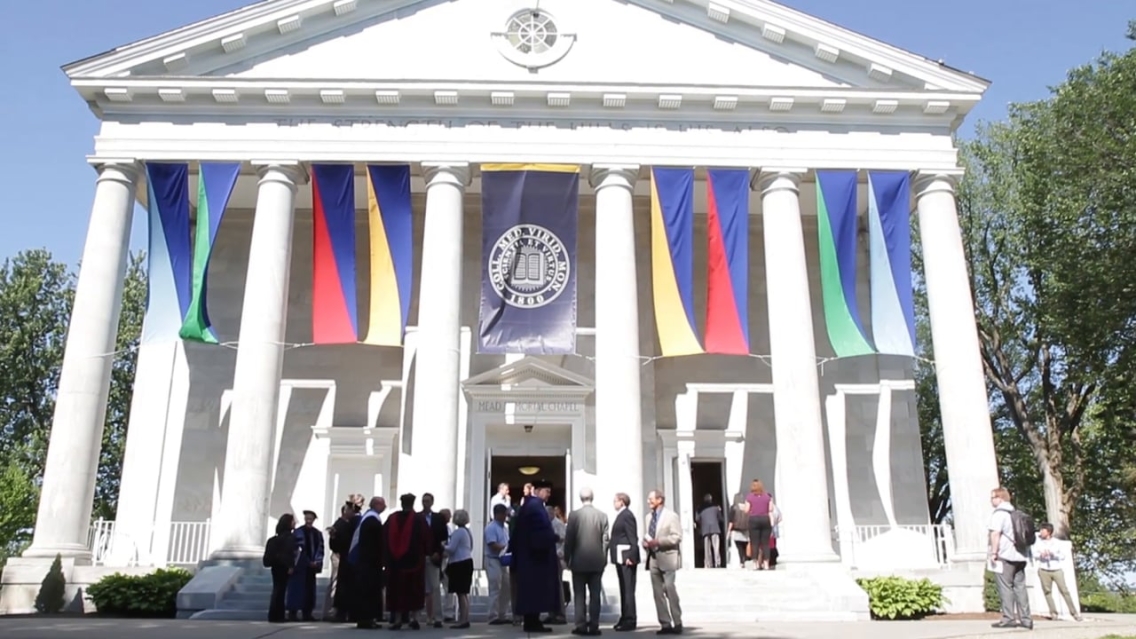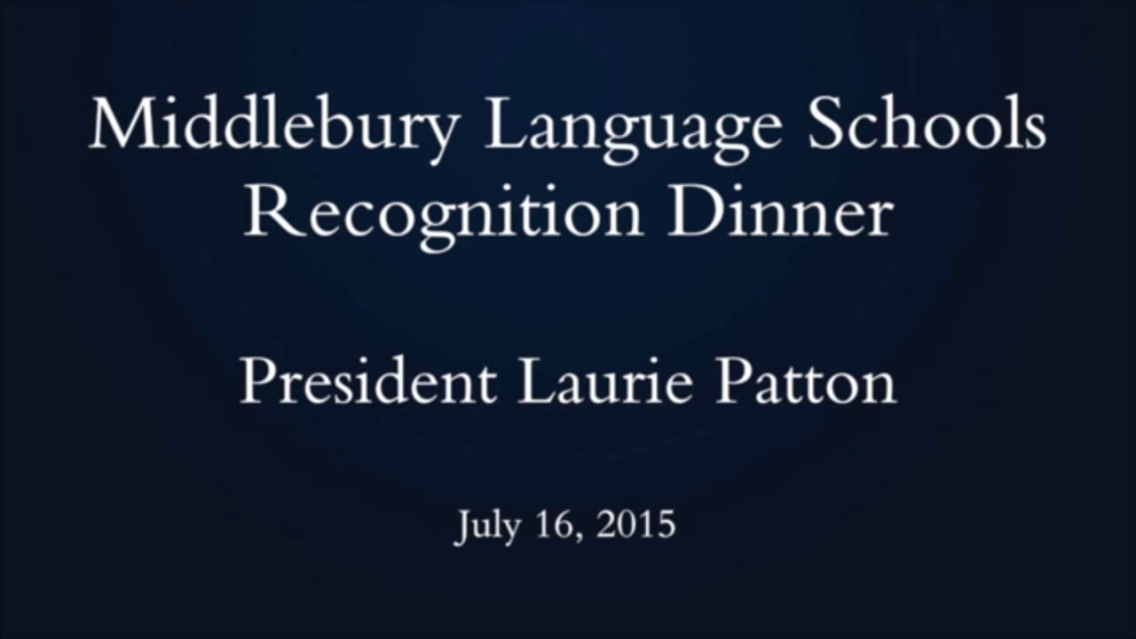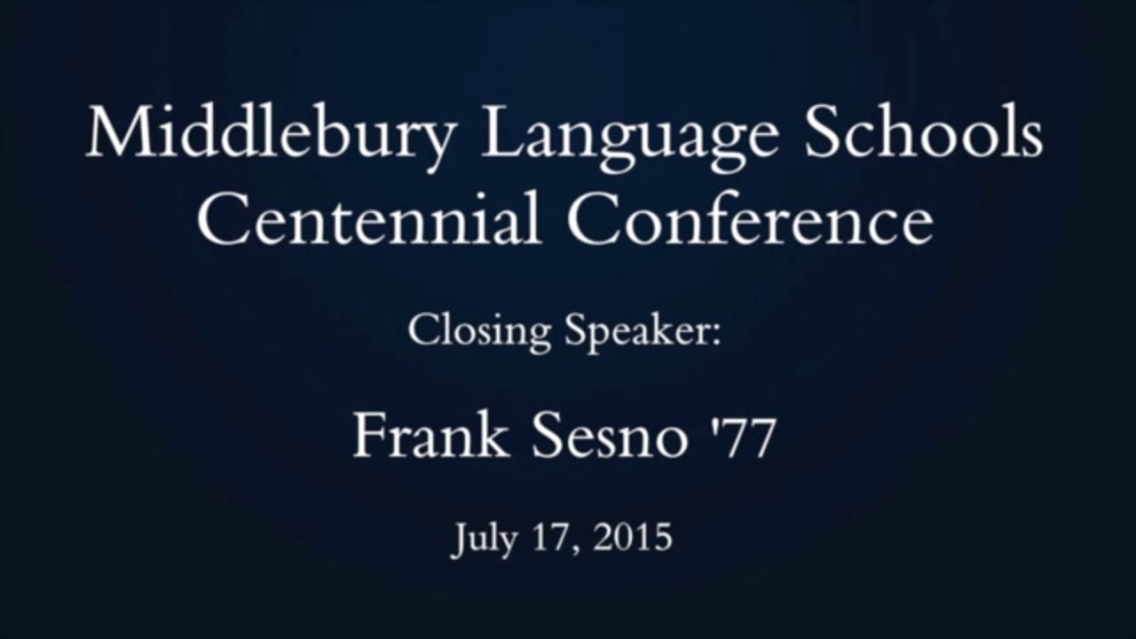Language Schools Centennial
MIDDLEBURY, Vt. – A celebration 100 years in the making swept through the Middlebury campus last week, honoring the Centennial of the Middlebury Language Schools. Over the course of 10 days, the community enjoyed international music, art, and cultural events as well as a two-day conference that drew scholars and educators to explore the effects of globalization on local identity, economics, and language learning.
Middlebury’s President Laurie L. Patton opened the conference on July 16 by saying that the uninterrupted journey of the Language Schools since 1915 is “a feat to be admired, embraced, and indeed celebrated.” As the morning light glowed in the maples surrounding Mead Chapel, the 17th president moved immediately to the formal presentation of an honorary doctorate to Marna C. Whittington, chair of the Middlebury Board of Trustees.
Centennial Videos |
“Marna is an ambassador par excellence for Middlebury’s values in the board room, in Vermont, in California, and in the many campuses we call home,” Patton said. “She embraces our challenges for the future with all the enthusiasm and grace the best ambassadors have.” Citing Whittington’s “leadership, advocacy, and vision” along with her “intellect, tenacity, and curiosity,” Patton conferred upon her a Doctor of Humane Letters degree, honoris causa, amid thunderous applause.
Next, Vice President and Centennial Co-Chair Michael Geisler welcomed guests to the celebration (which had been nearly two years in the planning), and promised that the ensuing conference would be a thought-provoking “two-day conversation about language, culture, and the politics of place in the 21st century.”
In his opening remarks, Geisler spoke about the leveling of differences between peoples as a result of globalization and why “The Local App: Language and Culture in a Flat World” was selected as the topic for the Centennial conference. “America’s historically dismal performance in foreign language education compared to much of the rest of the world is just one of the many reasons why we need to nurture and support and encourage whatever venues we have that contribute to providing this country with a strategic language reserve,” said Geisler.
“The first person who figured out how to do this effectively was Dr. Lilian Stroebe, the founder of the Middlebury Summer Language Schools,” Geisler continued. Stroebe, a Vassar College professor of German, started the first intensive immersion program in languages at Middlebury in 1915. Geisler detailed Stroebe’s pedagogy and said, “The foreign language profession in America has finally caught up with her vision.”
It may have been the first time that Stroebe’s name was mentioned during the Centennial, but it surely was not the last. Middlebury had created – especially for this celebration – a series of commemorative Lilian Stroebe Medals to honor those who have supported the study of languages and cultures at Middlebury, and those who have advanced global citizenship and understanding.
Adrian Wooldridge, management editor and columnist for The Economist and the coauthor of six books on globalization and business, accepted the first Stroebe Medal and delivered the Centennial’s keynote address about the importance of local and regional knowledge in the global economy.
Slide Show |
|
[view:embed_content==497911] |
“The more globalized the world becomes,” Wooldridge said, “the more that finance can move freely [across borders], the more the talents of people can move freely, and the more these rooted regional local advantages become important. The more that finance can go to the areas that are good at fashion or making computers or design, the more that people can get to those places [and] the more that companies can go to those places.
“So the flip side of the world becoming flat is the world becomes more regionally specialized, more locally different. Less modernized; not more modernized. Companies are constantly moving their centers of excellence to places where they will get the best value for their money,” which explains why businesses are moving their engineering to Germany or their software development to Silicon Valley or their publishing to London.
Business leaders need to focus much more “on habits of mind and habits of the heart.” They should think of themselves less as engineers and “much more as cultural anthropologists and much more as linguists. They need to speak the local language, understand the local culture, and get inside the heads of local people,” Wooldridge explained.
As the conference continued, President Patton participated in the first forum of the gathering – a panel discussion titled “Framing the Global Academic Agenda” – and structured her remarks around the question: How do you retain a sense of the local in an increasingly global society?
Drawing on her fieldwork as a scholar of South Asian history, culture, and religion, the new president said, “Not only is the global dynamic and lumpy [as Wooldridge had termed it earlier in the day], we also have to assume at a deep level that the local is not static either.” She also stated, “As intellectual leaders, we need to create programs that embrace and study hospitality and international boundaries.” By hospitality she referred to “refugee situations and diaspora community experiences,” and in terms of debates about international boundaries she cited Kashmir where “there is a deep reassertion of the local.”
| There were five panel discussions at the Centennial conference. Watch them here. |
Patton elaborated on three other principles: “let the community where you are and where you live teach you,” “engage the languages that wake you up” (i.e., “lesser-taught languages are not lesser for those who speak them”), and “a sense of the local is not the same as a sense of the provincial.”
The panel also included Junko Hibiya, the president of International Christian University in Japan; Driss Ouaouicha, the president of Al Akhawayn University in Morocco; and former ambassador Donald Steinberg, the president and CEO of World Learning, a nonprofit that administers the School for International Training in Brattleboro.
On Thursday evening at a dinner for about 200 guests of the Middlebury Language Schools, Michael Geisler received a standing ovation for his accomplishments during his 10 years at the helm of Language Schools, Schools Abroad, and graduate programs.
President Patton delivered brief remarks for the gathering at Nelson Arena in which she paraphrased Charlemagne. “If you acquire a second language, you possess a second soul,” she said, adding, “Middlebury has celebrated and become the guardian of so many languages, that it has an extraordinary depth of soul. Its tradition of language teaching and pedagogical methods give it a depth of character that is recognized around the world. And that depth of intellectual character can only grow given the commitment and energy in this room today.”
The president saluted the “generosity, spirit and ambition” of Ted and Kathy Truscott, both members of the Class of 1983, who matched over 2,000 gifts to the 2014-15 Centennial Challenge with their own gift of $500,000; and the “transformational impact” of Betty and David Jones, who have endowed the Middlebury French School, which henceforth shall be known as the Betty Ashbury Jones MA ’86 School of French.
Later at the dinner, President Patton and Vice President Geisler conferred Lilian Stroebe Medals upon Jeffrey Cason, dean of international programs; Michele Forman, high school teacher of world history and Arabic language; Michael R. Katz, former dean of Language Schools and Schools Abroad, and professor emeritus of Russian; Elizabeth Karnes Keefe, assistant dean of Language Schools and Centennial co-vice chair.
Also receiving Stroebe Medals were: William Kieffer ’64, trustee emeritus and co-chair of the Centennial; Michael Lettieri, former director of the Italian School; Benjamin Rifkin, former director of the Russian School; Carolyn Tager MA ’66, a former World Bank executive and lifelong Language Schools supporter; and Roberto Véguez, professor emeritus of Spanish and long-time Language Schools administrator.
The conference’s closing address was delivered by Frank Sesno ’77, the former CNN White House correspondent and news anchor who currently serves as director of George Washington University’s School of Media and Public Affairs. Sesno used the occasion to lament the decline in foreign news coverage in the U.S., particularly the loss of international news bureaus and overseas-based correspondents among what he termed “legacy news organizations” such as the Boston Globe, San Francisco Chronicle, Newsday, Miami Herald, Chicago Tribune, and Baltimore Sun.
News organizations need to have reporters on the ground, people rooted in the language and culture to share the sights, sounds, smells, and feel of events as they unfold, the current member of the Middlebury Board of Trustees explained. “This is what we need to understand the world. We need to be there. We need to go on this journey. Having people there who live in these places and speak the language and engage others at that level is critical… There is no replacing solid in-country reporting by experienced journalists.”
Sesno spoke about the effects of globalization upon journalism, and about the rise of social media in disseminating the news. “Pretty soon you’ll be watching the New York Times and reading CBS News,” he said.
Both before and after the conference, the Language Schools presented a range of cultural activities in celebration of Centennial. There was a recital by a French pianist and a concert of Israeli music with Ethiopian influence. There was a Japanese storytelling and paper-cutting demonstration, and a Museum of Art exhibition (through August 9) reflecting the countries and cultures of Middlebury. There was a Brazilian vocal performance and a Chinese-influenced banjo concert, and, in addition to the 1915-themed dance and fireworks display, current Language Schools students got in the act with their own performance showcase of many talents.
With reporting by Robert Keren; Photos by May Mantell




